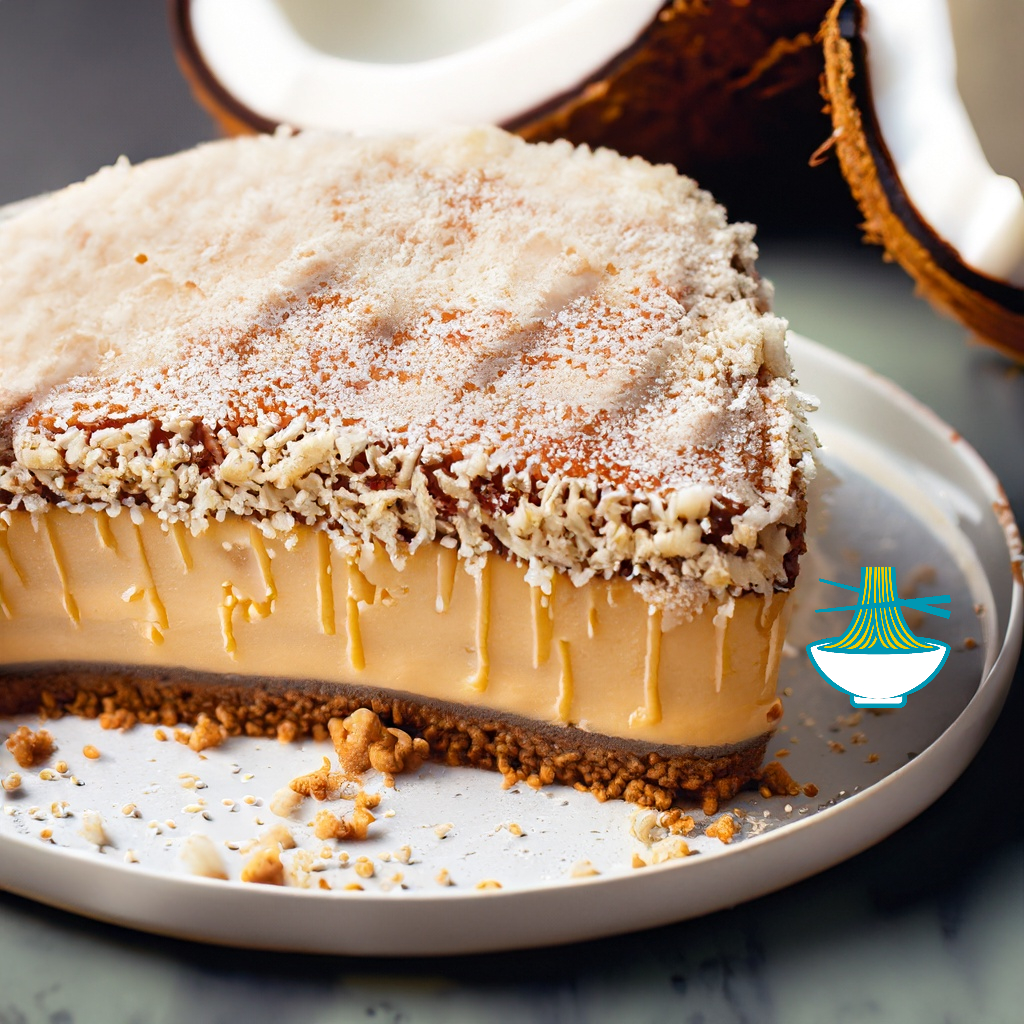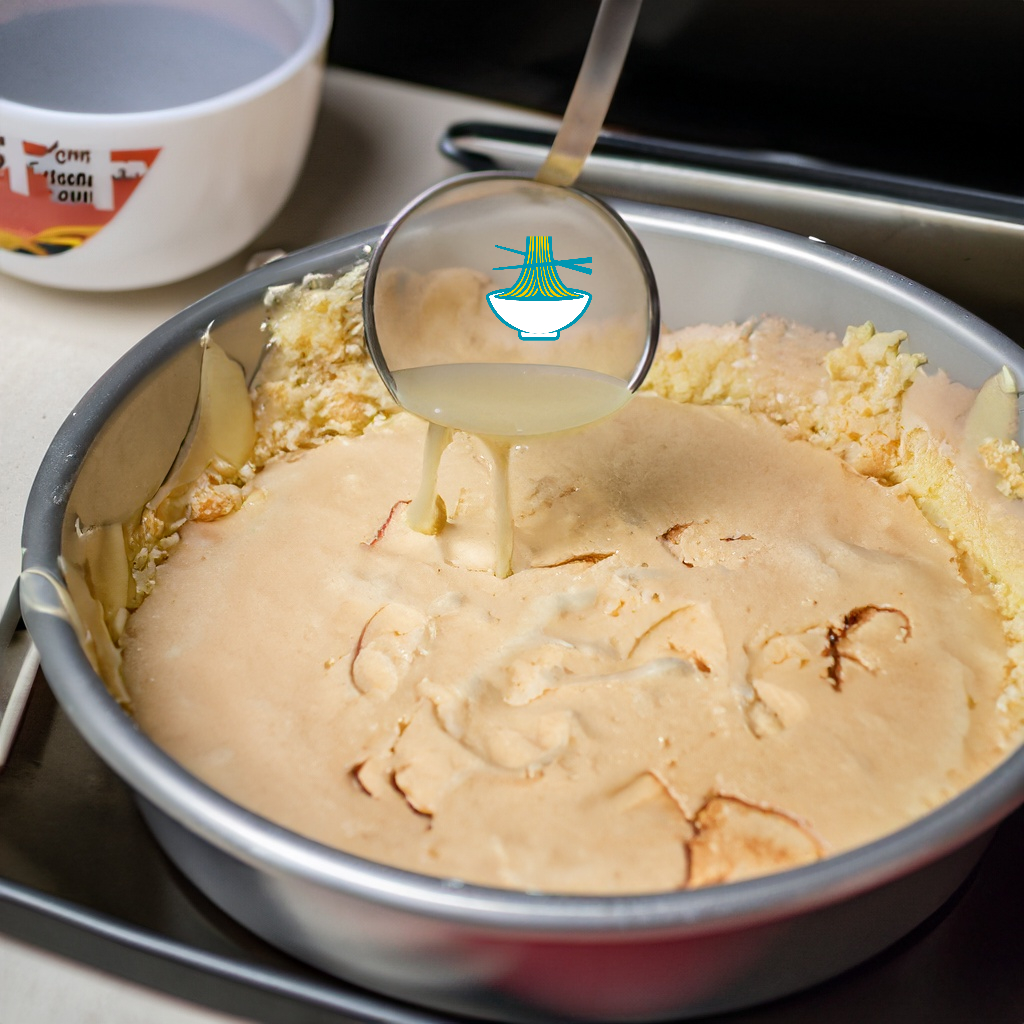Coconut sugar cake is a moist and flavorful dessert made with coconut sugar, almond flour, and coconut flour, making it a healthier alternative to traditional cakes. Coconut sugar, derived from the sap of the coconut palm tree, has a lower glycemic index than regular sugar, causing a slower rise in blood sugar levels, which is beneficial for those managing blood sugar or looking for healthier sweeteners. The cake is naturally gluten-free, perfect for individuals with gluten sensitivity or celiac disease. Additionally, almond flour provides healthy fats and protein, enhancing the cake's nutritional value. This cake can be made vegan by using flax eggs instead of regular eggs. Overall, it is a delicious dessert option that offers both taste and health benefits.
Ingredients:
1- 1 1/2 cups almond flour
2- 1/2 cup coconut flour
3- 1/2 cup coconut sugar
4- 1 teaspoon baking powder
5- 1/2 teaspoon baking soda
6- 1/2 teaspoon salt
7- 1/2 cup coconut oil, melted
8- 1/2 cup almond milk
9- 2 eggs (or 2 flax eggs)
10- 1 teaspoon vanilla extract
Healthy Substitutes:
If you are missing some of the ingredients or prefer alternatives, there are a few healthy substitutes you can use:
- Almond Flour: If almond flour is unavailable, you can substitute it with sunflower seed flour or oat flour. However, keep in mind that the texture might vary slightly.
- Coconut Flour: If coconut flour is not available, you can substitute it with more almond flour, but you may need to adjust the liquid content in the recipe, as coconut flour absorbs more moisture.
- Coconut Oil: Coconut oil can be replaced with olive oil or avocado oil for a milder flavor and a different nutritional profile.
- Eggs: For a vegan alternative, flax eggs are an excellent substitute for regular eggs. For each egg, mix 1 tablespoon of ground flaxseeds with 3 tablespoons of water and let it sit for 5 minutes.
Instructions:
1- Preheat your oven to 350°F (175°C). Grease an 8-inch (20cm) round cake pan with coconut oil and line the bottom with parchment paper.
2- In a large mixing bowl, combine the almond flour, coconut flour, coconut sugar, baking powder, baking soda, and salt. Mix well.
3- In a separate mixing bowl, whisk together the melted coconut oil, almond milk, eggs (or flax eggs), and vanilla extract until well combined.
4- Add the wet ingredients to the dry ingredients and mix until well combined.
5- Pour the batter into the prepared cake pan and spread it out evenly with a spatula.
6- Bake the cake for 25-30 minutes, or until a toothpick inserted into the center of the cake comes out clean.
7- Remove the cake from the oven and let it cool in the pan for 10 minutes.
8- Carefully remove the cake from the pan and let it cool completely on a wire rack.
9- Serve the cake with fresh fruit, whipped cream, or coconut cream.
Ways to Add Additional Flavors:
- To enhance the flavor profile of your coconut sugar cake, you can experiment by adding different spices or fruits. For example, a teaspoon of cinnamon or nutmeg can give the cake a warm, cozy flavor, perfect for the fall. Adding a handful of fresh berries, such as blueberries or raspberries, can give the cake a fruity twist. For those who prefer tropical flavors, shredded coconut or a small amount of pineapple can elevate the cake’s taste and texture.
Notes:
1- You can use any type of milk you prefer, such as soy milk or oat milk, instead of almond milk.
2- If you are making the cake vegan, use 2 flax eggs instead of regular eggs. To make flax eggs, mix 2 tablespoons of ground flaxseed with 6 tablespoons of water and let it sit for 5 minutes before using.
3- Make sure to use a high-quality coconut oil for the best flavor.
4- You can also add shredded coconut to the cake batter for extra texture and flavor.
Advice for Specific Diets:
If you're following a specific diet plan, such as a ketogenic or low-carb diet, this cake can still fit into your routine:
- Keto-Friendly: Coconut flour and almond flour are both low in carbohydrates, making this cake an excellent choice for a ketogenic diet. However, the recipe may need to be adjusted by reducing the number of coconut sugar or substituting it with a zero-calorie sweetener like stevia or erythritol to make it truly keto-friendly.
- Low-Carb Diet: For those on a low-carb diet, this cake is already a great option due to its use of almond and coconut flours, which are much lower in carbs compared to wheat flour.
Tips for Storing the Cake:
- To maintain the freshness and moisture of the coconut sugar cake, it is essential to store it properly. Allow the cake to cool completely before storing it to prevent excess moisture from accumulating inside the container. Store the cake in an airtight container at room temperature for up to 3 days. If you want to keep it fresh for a longer period, consider refrigerating it for up to 7 days. To further preserve the cake, you can freeze it. Wrap individual slices in plastic wrap or aluminum foil and place them in a ziplock bag before freezing. To thaw, leave the cake at room temperature for a few hours or microwave it for a few seconds.
Health Benefits of Key Ingredients:
Coconut sugar, almond flour, and coconut oil are packed with health benefits that make this cake a nutritious choice:
- Coconut Sugar: A lower glycemic index compared to regular sugar, which means it causes a slower rise in blood sugar. This is beneficial for those with diabetes or anyone looking to avoid sugar spikes. Additionally, it contains small amounts of iron, zinc, and calcium, which are vital for immune health and bone strength.
- Coconut Oil: Known for its medium-chain triglycerides (MCTs), coconut oil can boost metabolism and energy levels. It also has antimicrobial properties, which can help fight bacteria and viruses. Moreover, coconut oil is rich in lauric acid, which benefits the immune system.
- Almond Flour: Rich in protein, healthy fats, and vitamin E, almond flour supports muscle health, provides energy, and helps maintain skin health. It’s also beneficial for heart health due to its monounsaturated fats.
Frequently Asked Questions (FAQs):
Can almond flour be replaced with another flour?
- Yes, almond flour can be substituted with coconut flour or another gluten-free flour, though the texture may change, and adjustments to the liquid content might be necessary.
Can coconut oil be replaced with another type of oil?
- Coconut oil can be substituted with olive oil or avocado oil if you prefer a different flavor or don't have coconut oil on hand.
What are the health benefits of using coconut sugar?
- Coconut sugar has a lower glycemic index than regular sugar, meaning it causes a slower rise in blood sugar. It also contains small amounts of important minerals like iron, zinc, and calcium that support the immune system.
Can this recipe be made sugar-free?
- Yes, you can replace the coconut sugar with natural sweeteners like stevia or erythritol to make the recipe sugar-free.
What are the correct quantities of each ingredient?
- The recipe includes detailed quantities for each ingredient, and the nutritional information for each ingredient is provided as well.
Nutrition Facts (per slice):
- Calories: 280
- Total Fat: 22g
- Saturated Fat: 14g
- Cholesterol: 35mg
- Sodium: 220mg
- Total Carbohydrates: 16g
- Dietary Fiber: 5g
- Sugars: 6g
- Protein: 7g
Here are the approximate nutrition facts for the given ingredients in the specified quantities:
1 1/2 cups almond flour:
- Calories: 960
- Fat: 84g
- Carbohydrates: 36g
- Fiber: 18g
- Protein: 36g
benefits:
- Nutrient-Rich: High in vitamin E, magnesium, and fiber.
- Heart Health: Contains monounsaturated fats that help reduce cholesterol levels.
- Blood Sugar Control: Low in carbs and high in healthy fats and fiber, which can help manage blood sugar levels.
1/2 cup coconut flour:
- Calories: 240
- Fat: 8g
- Carbohydrates: 48g
- Fiber: 36g
- Protein: 12g
benefits:
- High Fiber: Promotes digestive health and helps maintain stable blood sugar levels.
- Gluten-Free: Suitable for those with gluten sensitivities or celiac disease.
- Healthy Fats: Contains medium-chain triglycerides (MCTs) that may boost metabolism.
1/2 cup coconut sugar:
- Calories: 400
- Fat: 0g
- Carbohydrates: 100g
- Fiber: 0g
- Protein: 0g
benefits:
- Lower Glycemic Index: Causes a slower rise in blood sugar compared to regular sugar.
- Nutrient-Rich: Contains trace amounts of vitamins and minerals like iron, zinc, and calcium.
- Natural Sweetener: Less processed and retains some nutrients from the coconut palm.
1 teaspoon baking powder:
- Calories: 0
- Fat: 0g
- Carbohydrates: 0g
- Fiber: 0g
- Protein: 0g
benefits:
- Leavening Agent: Helps baked goods rise, resulting in a lighter texture.
- Neutral pH: Contains both acid and base, making it balanced for baking needs.
1/2 teaspoon baking soda:
- Calories: 0
- Fat: 0g
- Carbohydrates: 0g
- Fiber: 0g
- Protein: 0g
benefits:
- Leavening Agent: Helps dough rise by releasing carbon dioxide when combined with an acid.
- Alkaline Properties: Can help neutralize acidity in recipes and may have benefits for digestive health.
1/2 teaspoon salt:
- Calories: 0
- Fat: 0g
- Carbohydrates: 0g
- Fiber: 0g
- Protein: 0g
benefits:
- Flavor Enhancer: Improves the taste of baked goods.
- Essential Mineral: Provides sodium, which is necessary for maintaining fluid balance and nerve function.
1/2 cup coconut oil, melted:
- Calories: 960
- Fat: 112g
- Carbohydrates: 0g
- Fiber: 0g
- Protein: 0g
benefits:
- Healthy Fats: Rich in medium-chain triglycerides (MCTs) that can boost energy and metabolism.
- Antimicrobial Properties: Contains lauric acid, which has antibacterial and antiviral benefits.
- Skin Health: Beneficial for skin when consumed or applied topically.
1/2 cup almond milk:
- Calories: 15
- Fat: 1g
- Carbohydrates: 0.5g
- Fiber: 0g
- Protein: 0.5g
benefits:
- Low Calorie: Lower in calories than cow's milk, making it suitable for weight management.
- Lactose-Free: Ideal for those with lactose intolerance or dairy allergies.
- Vitamin E: Rich in vitamin E, which supports skin health and acts as an antioxidant.
2 eggs (or 2 flax eggs):
- Calories: 140
- Fat: 10g
- Carbohydrates: 1g
- Fiber: 0g
- Protein: 12g
benefits:
Eggs:
- Protein-Rich: High-quality protein essential for muscle repair and growth.
- Nutrient-Dense: Contains vitamins A, D, B12, and choline, which are important for brain health.
- Healthy Fats: Provides omega-3 fatty acids, beneficial for heart health.
Flax Eggs:
- Omega-3s: Rich in alpha-linolenic acid (ALA), a type of omega-3 fatty acid.
- High Fiber: Promotes digestive health and helps regulate blood sugar levels.
- Plant-Based Protein: Suitable for vegan and plant-based diets.
1 teaspoon vanilla extract:
- Calories: 12
- Fat: 0g
- Carbohydrates: 1g
- Fiber: 0g
- Protein: 0g
benefits:
- Antioxidant Properties: Contains vanillin, which has antioxidant benefits.
- Flavor Enhancer: Adds a rich, aromatic flavor to baked goods.
- Anti-Inflammatory: May have anti-inflammatory properties, contributing to overall health.
Please note that these values are approximate and can vary depending on the specific brands and types of ingredients used.
Enjoy your delicious and healthy coconut sugar cake!


Comments